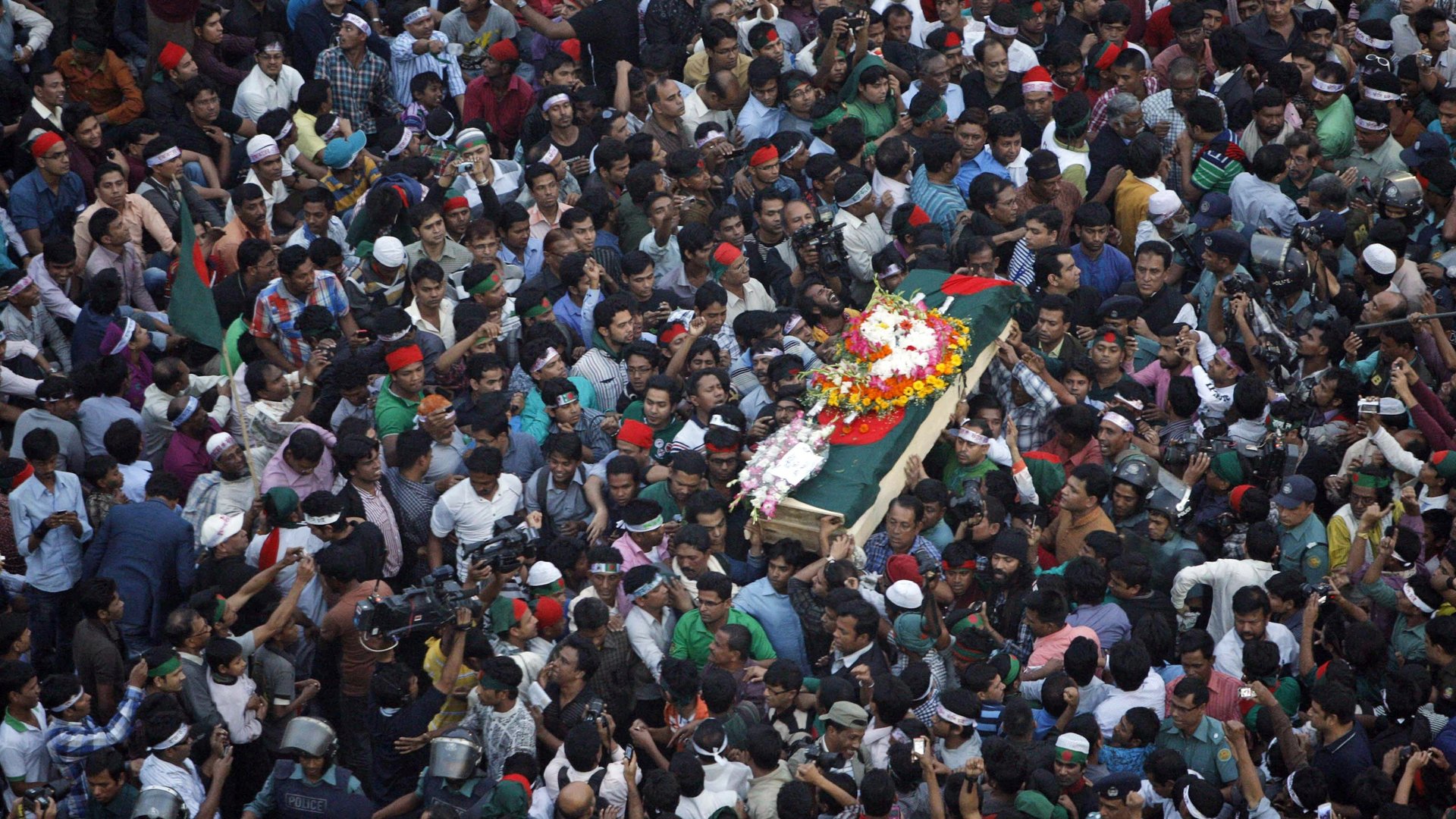Freedom of speech is under attack in Bangladesh
On Feb. 26, prominent Bangladeshi-American writer and cultural critic Avijit Roy was ambushed by a group of unidentified, machete-wielding assailants as he and his wife left a book fair in Dhaka, Bangladesh. His wife, Rafida Ahmed, also a writer, survived the attack, though sustained significant injuries. Her husband was not so lucky—he succumbed to his wounds later that evening.


On Feb. 26, prominent Bangladeshi-American writer and cultural critic Avijit Roy was ambushed by a group of unidentified, machete-wielding assailants as he and his wife left a book fair in Dhaka, Bangladesh. His wife, Rafida Ahmed, also a writer, survived the attack, though sustained significant injuries. Her husband was not so lucky—he succumbed to his wounds later that evening.
An Islamist militant group called Ansar Bangla-7 reportedly claimed responsibility for the attack. The author of several books on religious skepticism, Roy was also the founder and driving force behind Mukto-Mona, an influential and widely read secularist blog, which publishes writing by South Asian humanists, cultural and political critics. Mukto-Mona translates to “Free Mind” in Bengali.
Mere weeks after the attack on Roy and Ahmed, another Bangladeshi blogger was murdered in a similar manner. Twenty-seven-year-old Washiqur Rahman Babu was hacked to death on Mar. 30, outside his home in Dhaka. The Dhaka Tribune’s Mohammad Jamil Khan reports that two young men have been arrested in connection with the murder, subsequently confessing to killing Rahman for “writing on religious issues.”
“On his Facebook account, [Washiqur] wrote several notes opposing irrational religious beliefs, superstitions, and radical Islamists,” Khan writes.
These attacks have gained international notoriety perhaps because of how closely they coincided. Although prime minister Sheikh Hasina has described Bangladesh as a “secular democracy,” the murder of secularist writers is not a new phenomenon. In 2013, well-known blogger Ahmed Rajib Haider was killed just like Roy and Babu—hacked to pieces by a gang brandishing machetes. According to the Committee to Protect Journalists, Haider’s brother says he was targeted by the Islami Chhatra Shibit—the youth wing of Jamaat e-Islami, a Bangladeshi Islamist party.
Haider, like Roy and Babu, maintained an active, highly political Internet-presence. Most of his writings—on his personal blog and Facebook page—were relentlessly critical of Islamism. Haider garnered national attention in 2013 for his coverage of that year’s Shahbag protests: demonstrations in the Dhaka neighborhood of Shahbag, in which demonstrators demanded the execution of Jamaat leader Abdul Quader Molla.
Molla has been convicted on five charges of crimes again humanity for his involvement in the genocide of ethnic Bengalis during the 1971 war for Bangladeshi independence. According to the CPJ:
“On February 11, 2013, a blog, called Sonarbangla, which is run by members of the Jamaat-e-Islami party and its student wing, published a story calling Haider one of the main organizers of the protests, news reports said.
Police arrested five individuals who confessed to the murder and said they had received an order from an Islami Chhatra Shibir leader to kill Haider, and that it was their religious obligation to do so, reports said.”
Despite widespread conservatism in Bangladesh, most Bangladeshis would find the murder of free-thinking writers especially offensive. The country’s constitution, written in the bloody wake of the 1971 Liberation War, espouses four pillars, after all: nationalism, socialism, democracy, and secularism.
“Ironically we are living in a country where the constitution speaks for secularism, but society does not,” wrote Jawshan Ara Shatil in an Apr. 6 op-ed for the Bangladeshi news site BDNews24.
Shatil, also a contributor to Mukto-Mona, believes attacks on secularists signal a troubling problem taking root in Bangladeshi society. She quotes a blog post by Washiqur Rahman Babu:
“Mullahs have freedom, extremists have freedom, apologists have freedom, Muslims have freedom, corrupt people have freedom, political leaders have freedom, petty political leaders have freedom, rapists have freedom, armed forces have freedom, so called civil society has freedom, Pinaki has freedom, Shafi huzur has freedom, garment-factory owners have freedom, ship owners have freedom… Farmers and laborers are not free, nor are indigenous and minority groups, nor are freethinkers. All the people trying to be human are not free.”
Shatil and other Bangladeshi advocates for free speech worry that, without substantial, nationwide reflection, Babu, Roy, and Haider will have died in vain. “Ignoring the brutal killing of intellectuals, writers, and bloggers will create a future where no one will approach educating society,” she writes. “No one will speak up for human rights. No one will stand against the heinous activities of Islamic fundamentalist groups.”
“One war has started; this is not a war between secularists and Muslims,” clarifies Shatil, adding, “Rather, this is an ideological war between Bangladesh and radical extremists. At the end of this war, only one will remain extant.”
These are very bold remarks to make in the aftermath of fellow writers’ brutal murders. One can only hope Shatil’s compatriots heed her words—and that she does not pay too dearly for them.